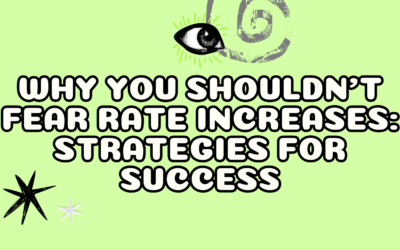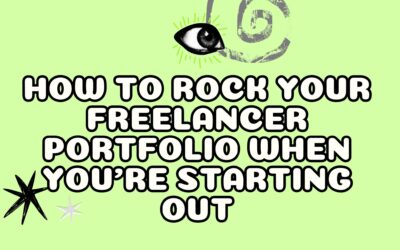Making sure your freelance client list is regularly topped up with paying work is a big struggle.
In fact, finding work is probably the hardest part about freelancing.
I remember in the early days, I’d spend the majority of my week hunting down potential prospects and reaching out to them.
While this is a great way to find clients that you’re going to love working with, it’s not always the quickest way to land a glut of clients at once (or get a consistent income, and we all know how fun the feast and famine cycle is…).
There is one thing you can do though.
Instead of finding individual brands, find agencies instead.
Agencies are companies that already have a roster of clients, a marketing strategy, an on boarding approach, and a set of services they offer. They bring freelancers on board to do different parts of each project.
For example, if they’ve just nabbed a client that wants a full website redesign, instead of doing it all themselves, they’ll find a freelance designer to create the wireframes and graphics, a freelance developer to build the site, and a freelance copywriter to create all the content.
The best part is that landing an agency gig is kind of like landing several clients at once.
But there are plenty of other reasons why agencies are good for freelancers:
- They do all the outreach and finding clients for you
- They handle all client communication so you can stick to what you do best
- They project manage everything, so you know exactly what you need to do and when
- They often provide consistent work because they sell packages and sign clients into ongoing contracts
There is a downside though: often agency work doesn’t pay as well as finding your own set of clients, which is why I recommend topping up your client base with agencies rather than making them the basis of your entire freelance client list.
How to Find Agencies to Pack Out Your Freelance Client List
Finding agencies is actually pretty simple, and it’s much less daunting than pitching individual brands because they’re actively looking for freelancers.
Even better, there are agencies that specialize in all different kinds of niches, so there’s bound to be one out there to fit your style.
Here’s how to find freelance agencies to pitch.
1. Choose How to Niche Down
here are two different ways I recommend searching for agencies to add to your freelance client list.
Firstly, look for agencies that serve clients in your niche. So, if you write for lifestyle brands, use that as a qualifier in your searches.
For example, type “lifestyle brand agency” into Google.
You’ll get results that look like this:

As you can see, the top three results are lifestyle-focused agencies working specifically with lifestyle brands. Bingo!
Alternatively, you can search for agencies based on their location.
It’s easier to spark a connection with someone if you have something in common, and location is one of those things we all love to talk about.
For example, I’m based in Brighton, UK, so I’d search for agencies there.
I might use a search term like “Brighton marketing agency.”

There are pages and pages of agencies in Brighton, so there’s bound to be at least one or two that are a good fit for me.
You can search for agencies based in your local area or the surrounding areas. This just helps narrow it down so you’re not completely overwhelmed.
2. Research Each Agency
When you’ve found a handful of agencies you want to reach out to, take a look through their website to get a feel for the kinds of projects they do.
This will help determine whether they need the skillset you have to offer.
For example, if you’re a writer but you see they mostly work on web design projects, they might not necessarily need someone with your skills.
Check out their About page, their Portfolio page, and any case studies they have to see if, first of all, you like the kinds of clients they work with and, secondly, their vibe fits yours.
You’ll be working closely with a team when you freelance for agencies, so it’s important you feel like you can get along with them.
Only the agencies you are excited about working with should move through to the next stage and make it onto your freelance client list.
3. Reach Out Via Email
The final step in the process is reaching out to the agencies you’d like to add to your freelance client list.
Unlike when you pitch individual brands (which can be hella daunting), pitching agencies is far less scary because their business model is centred around hiring freelancers. It’s what they do.
However, this also means there might be more competition and you definitely want to stand out in their inbox.
There are five ways to do this:
- Personalise your email to the agency (tell them why you want to work with them specifically or call out the agency owner by name)
- Mention a project they’ve worked on that you particularly admired
- Speak like a human! You’ll be working closely with these people, so treat them like friends and colleagues rather than “subjects”
- Highlight why you’d be a good fit (is it because you work for clients in the same niche as them? You’ve worked on a similar project they have in the past?)
- Link to your portfolio or samples for proof (provide proof where possible so agencies know that you can do what you say you can)
Pitching an agency doesn’t have to be as structured as pitching a brand. In fact, you can keep things really casual (especially if this is the vibe the agency gives off on their site).
For example, you might send a short email like this:
Hey [NAME],
I love the [project] you did with [brand they worked with]! The end result was [adjective] and I think you really captured the [something they captured].
I see you work with a couple of freelancers, are you looking for any other help? I’m a [type of freelancer you are] who works with [type of client you work with]. In fact, my last project was very similar to the one you did with [client they worked with].
I’d love to chat more if this is something you’d be open to!
[sign off]
4. Connect With Agency Owners On Social Media
If you’re in the pitching game, you know that you have to be consistent and persistent to win. As you gather brand names to reach out to, don’t forget to do the same with agencies. Add agencies to your roster of clients to pitch each week as this can be a fruitful way to get some small wins.
And remember: even if an agency doesn’t snap you up right away, it doesn’t meant the opportunity is lost forever.
I’ve had agencies get back in touch with me months (and in one case, years) after I reached out in the first place because they had a project crop up that I would be a perfect fit for.
5. Consistently Add Agencies to Your Pitch List
While traditional search methods like Google are great for finding agencies, don’t overlook the power of social media and specialized freelance platforms to connect with potential collaborators. Today, agencies are more active than ever on platforms like LinkedIn, Instagram, and even Twitter, sharing their work, culture, and often advertising their need for freelancers. Here’s how to leverage these spaces:
- Engage on LinkedIn: Follow agencies in your niche and engage with their content regularly. Comment on their posts and share insightful thoughts to get on their radar. You can also use LinkedIn’s search function to find agency hiring managers or team leads and send personalized connection requests, explaining briefly who you are and what you do.
- Join Freelance and Niche Facebook Groups: There are plenty of Facebook groups where agencies and freelancers gather. These groups often have job postings or discussions that can lead to new opportunities. Participate actively and share value, so people remember you.
- Utilize Platforms Like Upwork or Freelancer: While these platforms are often associated with one-off gigs, many agencies use them to find specialized freelancers for ongoing projects. Optimize your profile with keywords related to the type of agency work you’re looking for and pitch your services professionally.
6. Consider Remote Work Opportunities
Since remote work has become the norm for many agencies, you no longer have to limit your search to just local or regional options. Today, it’s easier than ever to collaborate with agencies worldwide, which opens up a broader pool of opportunities. Don’t be afraid to look beyond your geographic area and reach out to agencies based in different cities—or even different countries—if their projects align with your expertise.






Totally agree, finding work is probably the hardest part about freelancing. I tried Freelancer.com and Fiverr. The most frustrating part was finding gigs.